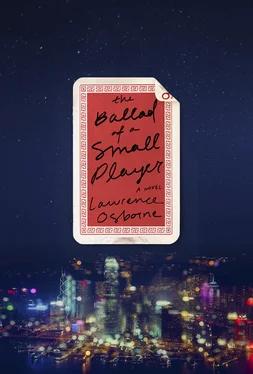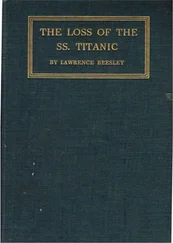I opened the box anyway, and sure enough there were thousands of Hong Kong dollars and kwai stuffed into it. It was a small fortune. The accumulated earnings of a couple of years at least. She was getting ready to send it back to the monastery in Sando and make merit. She was, after all, a good Buddhist country girl and she would never spend the money on herself until she had made merit by sending her lucre home. Her instincts were predictable.
I wasn’t hungry until late in the day, and she had still not come home. I sat on the deck and watched the fishing boats parade around the straits. At last I took a few bills from the box and walked down to the restaurants, where the tanks were being shown to a party of German tourists. The owners seemed surprised to see me at such an early hour and they asked me in Cantonese if I wanted my usual table. “I didn’t know I had one,” I said.
“You always sit at table seven,” they said.
I sat at table seven, then. They brought a menu and I asked for slipper lobsters.
“It stopped raining,” I remarked.
The owners of this place were an elderly couple and I had to wonder if we had dined here or somewhere else. When the old bird brought my soy sauce I asked her casually if she had seen my friend, the woman I always ate with. Dao-Ming would have to walk through the restaurants to get to the ferry. She said Dao-Ming went to take the boat early and no one ever saw her. I ate my lobsters slowly. When the old geezer came to ask me how they were, as he always did, I asked him the same question. He seemed slightly insulted by it, as if such things could never be any of his business. Instead, he thought it was more appropriate to ask what I was doing all by myself in the house on the hill. There were no other foreigners living there.
“My wife says you are hiding from the Tong. Silly. I said you were on a fishing trip. Which is it?”
“Hiding from the Tong.”
We laughed.
“I see,” he said. “It won’t do you any good.”
“No, I suppose not.”
He offered me a free glass of brandy.
“The Tong will find you anywhere.”
I wondered if he was pulling my leg, but the more we sipped the brandy the more I understood that this was not the case. He thought of me as the loner who came down from the hill for his dinner. It was preposterous. He said he had been anxious for my health. I was looking better, he said, and he supposed it might be something to do with his slipper lobsters.
“My friend introduced me to them,” I said.
“Your friend?”
“Yes, the Chinese girl.”
He laughed, as if without reference to me.
“You found them yourself. You came to the tank and picked them out. You even knew the Cantonese word for them.”
“Me?”
“We were surprised.”
“Every night—”
“My wife said she’d never seen such a lonely man. Every night,” he said sympathetically, “sitting at table seven eating lobsters and talking to yourself. My wife said you were a drunk. Forgive her — she didn’t mean it badly.”
“No, I don’t mind.”
He went off, and I finished the delicate slipper lobsters lying so grandly on their backs. I ate them with my fingers, as Dao-Ming had done, with kale dipped in soy, and soon I was aware of the movement of the sea a few feet below me, its circular motions, and the silhouettes of the hillsides losing their luminous definition and fading. The slowness of this fade was in inverse proportion to the subtle fear that rose inside me, the slowing down of my sense of normality and proportion. I wondered if I had missed the beat of his Chinese. But he had said that his wife thought I was a drunk drying out in a cabin in the woods. I had heard them correctly. The increasing vagueness of the darkness was inside me as well, and Dao-Ming was lost inside it. A brief encounter blown up out of all proportion by timing.
My hands shook as I scooped out the flesh of the lobster, and when I was done I wiped them down elaborately with a napkin and a bowl of water with a slice of lemon floating in it. The Germans roared. They were pounding down bottles of some clear liquor. Increasingly, my feeling of repulsion for my fellow Europeans was getting the better of me. But I went for the rice brandy to forget them.
The house had an abandoned feel when I returned there, as if it were now clear that Dao-Ming would not be coming back that night, and I made myself some tea and lay down for a while.
It was still quite early, but I was restless. I wandered about, flicking open the drawers and poking into the cupboards, playing the spy, a role to which I had no right whatsoever. Soon I began to realize that there were no traces of her at all in this place, and that even the postcard with the image of the lamasery was not necessarily hers. I turned it over and saw that there was a message written in Mandarin on the reverse side. The characters for good luck, written by someone from the other end, I imagined, the strokes long and sloppy and slightly stylized. The lamasery was identified merely as Typical picturesque monastery in Kham . Three white stupas at the edge of a forest.
I went into the bathroom and rummaged through things that were not hers, or even female. Ancient razors left by a long-ago tenant, and a tube of toothpaste. The mirror was frosted by what looked like a layer of salt. In the drawers were scissors, cotton balls, and some antibiotics. The towels were freshly laundered. Not just laundered but ironed. The bath had been recently cleaned and there was an air freshener hanging from the rail. The house was not quite aligned in a natural way; it had the slightly paranoid orderliness of a hotel room. As I came into view of the mirror I saw that my head was distended slightly upward by a fault in the mirror’s surface, and that my mouth appeared far larger than it was, like a mouth pulled wide with two fingers to make a face. The surface of the face seemed blurred, smeared, as if it were made of a soft wet paint that had been pushed flat and to one side. I rubbed my eyes and tried to see it again afresh, but the image of my own face did not clarify.
I went back into the front room and opened the box. If it was not Dao-Ming’s house then there was the question of whose money this was. But of course it was her money, it was the money from the hours spent in those hotel rooms with salarymen, the money she was going to send home. I scooped out all of the box’s contents and laid it on the countertop. It was quite a haul, at least several thousand, and I began — without thinking or calculating — to roll it up in wads and stuff it into my pockets. Soon I began to balloon up with cash, and I wondered if this would make me look suspicious on the night ferry. No matter. I stuffed every last note into my clothes and then made myself a pot of tea and lay down. If she came back now I’d have some explaining to do, but I was instinctively sure that she wouldn’t. When the tea had gone down and I had thought everything over, I wrote her a note. It was an apology of sorts, and there was nothing much in it. I said it was an ungrateful thing to do, but perhaps — somehow — she could understand. It was stronger than me. Moreover, I would send it back to her as soon as I earned it back. I would definitely earn it back, I said, and it wouldn’t be long.
I left the note on the table. Finally I put on my overcoat, which had been hanging on the door, and prepared to leave. As I closed the front door I happened to look down and saw that she had written a telephone number on the inside of my right palm, which I hadn’t noticed earlier for some reason. It was curious. I held my palm up under the porch light and saw that there were eight numbers, which is not usual for Hong Kong, and that she had scrawled them there with a felt pen by way of a light au revoir . Eight numbers in blue etched diagonally across my hand. To remind me, to let me know that she was there and that I should call her. I marveled at the nearness of the numbers. She must have written them while I was asleep.
Читать дальше












